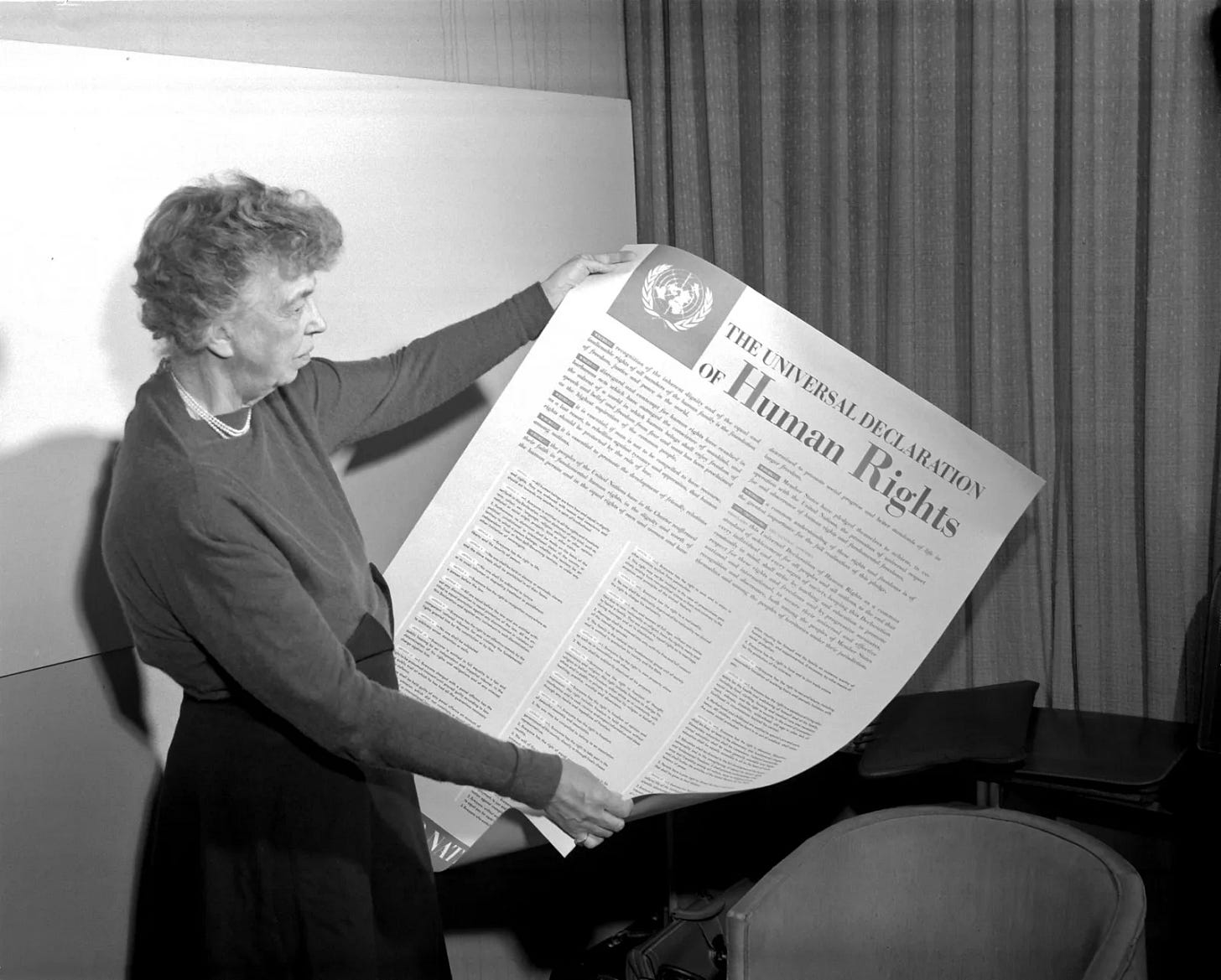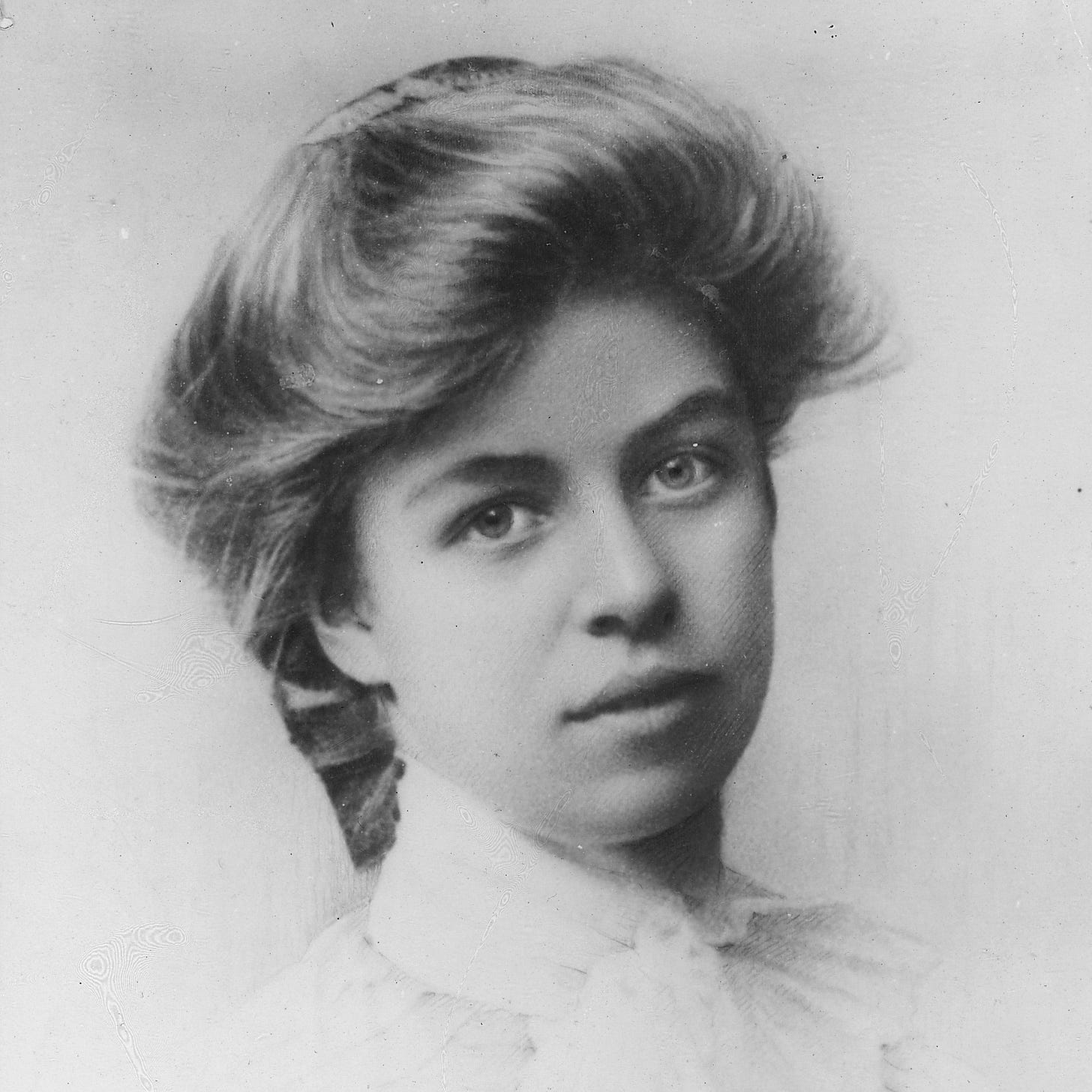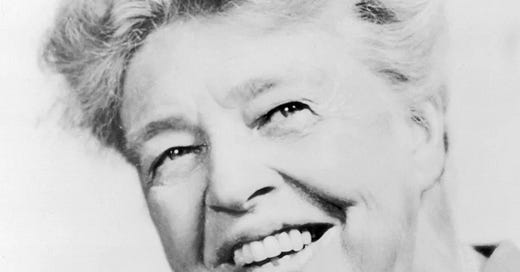Eleanor Roosevelt: unparalleled, spirited, & more than "just" a First Lady
Trailblazing and inspiring women #1
This is part of my "Trailblazing and inspiring women" (TIW) series in which I'll be talking about women that audaciously fought their way into male dominated areas and paved the way for all who followed after them or inspired and helped other women to do so.
Don't worry, these TIW sidenotes won't be a comprehensive treatise of their lives or their accolades. No, too many of those around already (like those linked in the footnotes).
Instead, I'll be talking about the trails they blazed, what I find inspiring about them, and also what I don't like about them. In addition, I'll selectively (and totally subjectively) include stuff that caught my eye during my dive into their lives. And I'll finish with a takeaway: what they did that we can apply to our advantage in our own lives.When I was deciding who I was going to write about first, I didn't have to think long.
Eleanor Roosevelt had to be the first.
She was a formidable figure. Not only as a First Lady with a 12-year reign, but long before and after that as well. She was a powerful, well-respected political figure and advocate in her own right, who was the world's most admired and powerful women of her time and for decades after.
Read on!
Why do I think Eleanor Roosevelt is a trailblazer?
Eleanor Roosevelt1 had encouraged FDR2 to remain in politics. Much to Sara Ann Delano’s, FDR's mother, dismay, who thought he should retire and become a “country gentleman”. She supported him by taking up many public engagements in his name and traveled throughout the United States to provide him with objective reports. She also traveled far and wide around the world.
Despite that, she wasn’t happy about him running for president. She’d experienced the role of political wife during his New York governorship, and found it to be filled with tedium. Considering the First Lady’s role up until then hadn’t been much different, she dreaded the prospect.
When it became reality, she was determined to do things differently. Louis Howe, FDR's political advisor, and Lorena Hickok, an AP reporter, encouraged and helped her, even if they didn't always agree with what she planned to do.
Unlike any before her, she used her position to advocate for her ideas and the causes she found important. And, equally unlike any before her, she used the media to her advantage. You could call her media savvy avant-la-lettre.
She helped women take on what had been male prerogatives and "infiltrate" male dominated professions. She exerted great influence on FDR's decisions and policies, including helping to shape his New Deal. And later sought revisions to various laws to help women and other groups left out of that New Deal, or discriminated against in programs under its name.
In short, Eleanor Roosevelt was the first “presidential spouse” — as Wikipedia puts it as if there had been, or will be any time soon, any male US presidential spouses — to take on a very public role, redefining what it means to be a First Lady, and setting the standard that every First Lady since has been and is measured against.
A hard act to follow.
Why do I find her an inspiration?
She was an independent thinker, outspoken, and self-confident
Much of which thanks to Marie Souvestre. Marie Souvestre was a French educator, who led London's Allenwood Academy and used her role to cultivate independent thinking in young women. Eleanor Roosevelt spent three years there, self-described as the happiest three years of her life.
She had the courage to be disliked
She was as — if not more — controversial than FDR. Her liberal views and her advocacy of them, earned her the label “most controversial First Lady”.
She remained within her integrity, acting in line with her values and views despite plenty of pushback.
She frequently, and publicly, disagreed with FDR. On at least one occasion even causing FDR to author an article in response to one of hers.
She ended her membership of the Daughters of the American Revolution when they refused to allow Marian Anderson (an African American singer) to perform in an all-white high-school. Then followed it up by organizing a concert for her at the Lincoln Memorial, and that drew a 75 thousand strong audience! (How’s that for a “Ha! Eat your heart out!” response.)
She held press conferences that only female reporters could attend, forcing many publications to hire at least one female reporter.
She regularly invited African Americans into the White House and would meet them at the gate to avoid problems with the staff.
She wasn't flawless
Thankfully so. What a bore she'd have been otherwise.
She was willing to change her mind
She had the heart, the courage, and the grace to change her mind and attitude when events or new facts called for that.
She was deliciously audacious
She called one of her programs (shows) "It's a woman's world" and titled one of her first books "It's up to the women". In 1935 and 1933 respectively! You just gotta love that. It must have been quite a feat, even as the First Lady, to get those titles accepted. After all, self-publication wasn't a viable option in those days and publishers and radio channels — actually all businesses back then — were male dominated controlled.
She was a long-before-it-was-a-thing diversity, equity, and inclusion advocate (see below).

Near and dear causes that caught my eye
Eleanor Roosevelt supported, promoted, and influenced the thinking on many causes. Basically anything related to her liberal views and goals. Here are the most prominent along with actions and positions that caught my eye.
Women's suffrage, political engagement, independence, and equality
She wasn't a fan of the "Equal Rights Amendment". She thought it would mean that women would lose the protection of laws they still needed. What she wanted instead amounted to diversity, equity, and inclusion, many decades before DEI became a thing.
JFK3 appointed her the chair on the Presidential Commission on the Status of Women. Though their report was published a year after her death, it's easy to see her views influenced its content and its conclusion: “female equality was best achieved by recognition of gender differences and needs, and not by an Equal Rights Amendment”.
She worked on the Equal Pay act. It's amazing and frustrating that 60+ years after her death we still have a gender pay gap that's even increasing (hey ho, percentage raises).
Racial equality and civil rights
At an event in Alabama she demonstratively put her chair in the aisle between the segregated seating that officials insisted on.
She was a lone voice to insist on benefits being equally distributed regardless of race. Especially so, after her inspection visits to the Southern States where she observed that their New Deal programs discriminated against African Americans.
She lobbied for the Costigan-Wagner Bill for lynching to become a federal crime. FDR refused to support it publicly as it might lose him votes in the Southern States. Unfortunately, that bill didn't pass the Senate.
She became so popular with African Americans that they switched from being staunch Republicans to being convinced and consistent Democrats! (Yeah, hard to imagine nowadays isn’t it?)
She spoke out against the treatment of and measures against Japanese Americans after the Japanese attack on Pearl Harbor. She publicly called FDR's policies into question and spoke of "great hysteria against minority groups".
Human rights
Appointed by Harry S. Truman, she served as a US delegate to the United Nations for over a decade. During that time, she chaired the United Nations' Human Rights Commission and was instrumental in drafting and advocating the adoption of the Universal Declaration of Human Rights.
In 1968, she received one of the first UN's Human Rights Prizes, some 6 years after her death.
What don't I like about her
I don’t much like how vocal she was about her faith, talking about it incessantly in her "My Day" and "If You Ask Me" columns.
That’s because I prefer people who own and live their values. People who show rather than tell. In other words: who act in alignment with them and without much talk. And when they do talk about them they do so from their own convictions without constantly bringing their source into the conversation.
Like when saying: “My faith requires me to [X]”, begs the question whether you’re just following rules or you yourself are convinced it’s what you want and need to do?
It’s also very much related to my dislike of logical fallacies. Specifically an appeal to authority: Authority A believes that P is true, therefore P is true. No. P may be true but definitely not because A says so.

Friends and foes
The lists are not comprehensive by any means! Nor do they reflect Eleanor Roosevelt's take on the people mentioned. They include names that caught my eye and the labels "friends" and "foes" are to be taken very loosely.
Friends
Marie Souvestre, her teacher at Allenswood Academy who took an interest in her and helped her regain her confidence and sense of self-worth.
Lorena Hickok, an AP reporter who helped her redefine the First Lady role.
Amelia Earhart, c'mon you know her, don't you, I mean who doesn't know Amelia Earhart? Eleanor Roosevelt flew with her and was inspired to learn how to fly by her. Nothing came of it, in part because FDR didn’t relish the thought.
Harry S. Truman, who appointed her to the United Nations and called her the "First Lady of the World" for everything she did in relation to human rights
John F. Kennedy, who appointed her to chair the Presidential Commission on the Status of Women
Foes
The people who raised her until she was sent to Allenswood Academy. Specifically, her father — an alcoholic —, her mother — an emotionally distant woman who thought her (too) plain for anything —, and her grandmother, a harsh and critical woman who raised her after both her parents died.
Sara Ann Delano, her extremely controlling mother-in-law, who was also harsh and critical towards her. It took FDR's paralysis and Eleanor Roosevelt's subsequent increasingly public role for her to break increasingly free from her mother-in-law's stranglehold on their marriage.
FDR who cheated on her with Lucy Mercer, Eleanor Roosevelt's social secretary no less.
Theodore Roosevelt Jr. who never forgave her for campaigning against him.
J. Edgar Hoover, kept an extended file on her (and probably FDR as well) because he abhorred her views on racial justice and civil rights, and possibly because she criticized Hoover’s surveillance activities and publicly denounced McCarthyism.
Tasty titbits
President Theodore Roosevelt was her uncle. He walked her down the aisle instead of her father who’d died before she was 10.
Sara Ann Delano, FDR's mother, had opposed the relationship and had done her best to pry FDR away from her, even taking him on a cruise to put some distance between them. Unsuccessful at this, Sara Ann Delano remained a controlling, critical thorn in Eleanor Roosevelt’s side.
When Eleanor Roosevelt found out about FDR's affair with Lucy Mercer, she offered him a divorce. He declined. Not necessarily because he wanted to stay married but because of pressure from his political advisor(s) and his mother.
So they remained married, but the whole sordid thing (self-described as one of the most traumatic events in her life) prompted Eleanor to sail her own course.
I can’t help but wonder.
If she hadn't found out about that affair, what would have become of either of them?
What would FDR's presidencies have looked like without her at his side? Without her influence on his decisions and policies, her very active and public role, and her objective reports from the length and breadth of the United States? Would he even have been elected?
My favorite quote by Eleanor Roosevelt
"No one can make you feel inferior without your consent."
It speaks to my belief that no one can make you feel anything without your consent.
Some people hate that quote because it seems to absolve people of taking responsibility for their behavior.
When spoken by someone who regularly behaves inconsiderately, it does feel like that. As gaslighting even. Because they can't or don't want to (have to) consider other people's feelings, while they show uncanny precision in pushing your buttons for whatever reasons suit them at any one time.
They're still your buttons, though.
And you have the power to cut the wire running between them and your emotions.
By now, neuroscience shows Eleanor Roosevelt had it right long before neuroscientists caught on.4
No one can make you generate mad, sad, glad, or afraid, or any other emotion.
Obviously, again, anyone who knows you, knows what behaviors inspire those emotions in you. But you, and nobody else, generates them.
Or not.
It's entirely your choice!
Take a page out of Eleanor Roosevelt’s book
Just like Eleanor Roosevelt, you can decide not to agree with someone’s opinions and judgments about you. And decide not to give anyone sway over your confidence or sense of self-worth.
Granted, it may take some desensitization and counter-conditioning, but you can break the chain between your buttons and your emotions. Yes, you too!
Remember that next time (you think) someone puts you down. Or when you advocate for your views and receive pushback like Eleanor did on many of hers.
And then... disagree with them!
Silently or out-loud, your choice 😎
Sources
FDR library: https://www.fdrlibrary.org/er-biography
Wikipedia: https://en.wikipedia.org/wiki/Eleanor_Roosevelt Don't discount this because it's on Wikipedia. It's a very comprehensive, tremendously informative, and well-researched page which references 300+ information sources.
National Women's History Museum: https://www.womenshistory.org/education-resources/biographies/eleanor-roosevelt
Britannica: https://www.britannica.com/biography/Eleanor-Roosevelt
FDR: Franklin Delano Roosevelt
JFK: John Fitzgerald Kennedy
Primarily because you, or rather your subconscious, generates your emotions about what happens around you based on your temperament (not your personality!) and all of your experiences and resulting beliefs to date.






Love the theme of trailblazing women. Plus Eleanor Roosevelt is a great choice as your first lady. Great summary of what she did and so interesting about other aspects of her life - her marriage and family relations for example. Friends and foes is another interesting way of looking at someone's life too. Looking forward to your next post on this theme, Marjan.